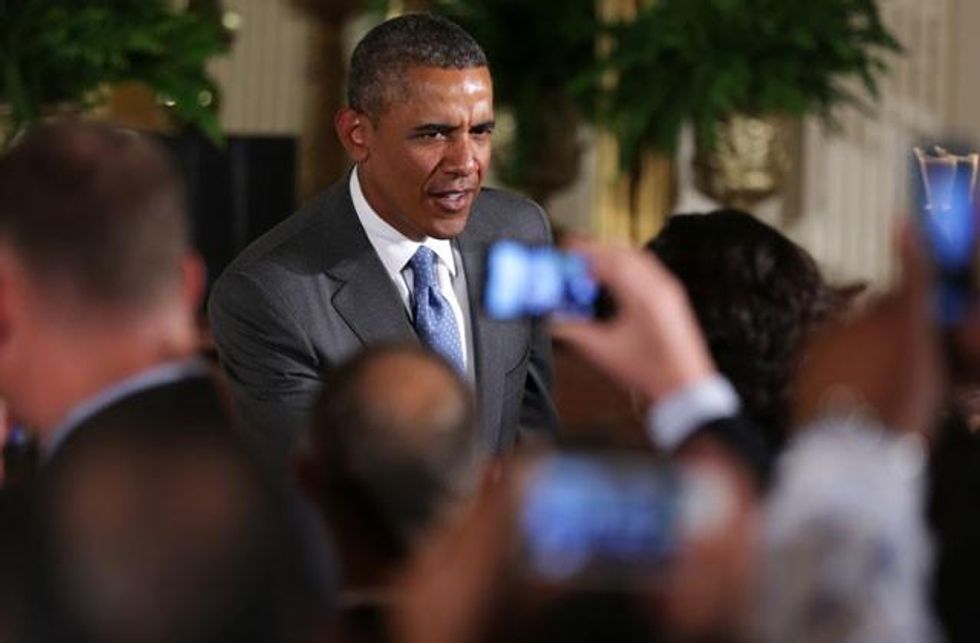The announcement that President Barack Obama will deliver the keynote address on August 28 at the same hour and place Martin Luther King presented the "I Have a Dream" speech 50 years ago has opened a debate about whether Obama is deserving of that honor. Given the subversive context of the 1963 March on Washington for Jobs & Freedom, which President John F. Kennedy initially discouraged thinking it would dissuade Congress on civil rights legislation, some find it questionable that President Obama would be involved in next week's commemoration. Obama is the first black president--made possible, no doubt, by the civil rights gains from the 1963 march--but he's also largely responsible for current policies that many civil rights activists consider violations of the spirit of that march.
"The moral arc of the universe is long, and it bends toward irony," wrote Jelani Cobb in his The New Yorker article "Obama, Surveillance, and the Legacy of the March on Washington."
From Cobb's article:
"The aggregated moral will of the civil-rights movement is responsible for the election of an African-American President of the United States--a President who, on Wednesday, will speak at an event at the Lincoln Memorial commemorating the march, and whose tenure coincides with the most expansive capacity for government surveillance this country has ever known."
Human rights activist Ajamu Baraka, the founder and former executive director of the U. S. Human Rights Network, shares this sentiment. On his blog, Baraka wrote that Obama should not be welcomed at the 50th commemoration of the March on Washington next week, and even made the case for a boycott of the event.
"The fact that Barack Obama will be standing in the shadow of Dr. King, his presence conveying the impression that he somehow represents the values and self-sacrificing lives of Dr. King, A. Philip Randolph, Bayard Rustin, Ella Baker, Rosa Parks and many of the thousands gathered that afternoon on the national mall, should be taken as an insult by everyone who has struggled and continues to struggle for human rights, peace and social justice," wrote Baraka.
When I spoke with Baraka earlier this week, he said that Obama's involvement means that the civil rights movement has now been "turned over to the government."
If the civil rights movement still belonged to grassroots civil rights organizers and the people they serve, then it would be "a space where we could define for ourselves where we are as a movement and as a people, and where we could articulate our vision for how to go forward," said Baraka. "That's the only way for us to maintain the autonomy and integrity of our movment. But by inviting the government, you set yourself up for the message to divert our attention away from [Obama administration] policies that are responsible for creating the conditions that we face today."
Baraka lists Obama's record-setting immigrant deportations, the assignment of human rights activist Assata Shakur to the FBI's most wanted list, military drone surveillance and drone strikes among those policies.
In Cobb's article, he notes how the data-trolling and privacy invasions of the National Security Agency ring too similar to federal government intrusions into the lives of civil rights leaders like Martin Luther King--"the sustained contempt and suspicion from J. Edgar Hoover and the bureaucratic overreach of his counterintelligence efforts to stall" the momentum of the civil rights movement."
Attorney General Eric Holder will speak at the march tomorrow, which will be led in part by King's family. While Holder has culpability for many of the problems identified by Baraka and Cobb, he has also led the defense and enforcement of the civil rights laws that sprang from the demands of the 1963 march. He blocked voting laws in Texas, South Carolina and Florida that ran afoul of civil rights policies last year. Just yesterday, he filed lawsuits against Texas after the state reinstated discriminatory election laws that were previously found violations of the Voting Rights Act.
Wisconsin Rep. George Sensenbrenner, who was largely instrumental in helping Congress reauthorize the Voting Rights Act in 2006, told Holder to halt his legal march against Texas because it would make a congressional fix of the Act "much more difficult" -- much like Kennedy told civil rights leaders 50 years ago.
 The announcement that President Barack Obama will deliver the keynote address on August 28 at the same hour and place Martin Luther King presented the "I Have a Dream" speech 50 years ago has opened a debate about whether Obama is deserving of that honor. Given the subversive context of the 1963 March on Washington for Jobs & Freedom, which President John F.
The announcement that President Barack Obama will deliver the keynote address on August 28 at the same hour and place Martin Luther King presented the "I Have a Dream" speech 50 years ago has opened a debate about whether Obama is deserving of that honor. Given the subversive context of the 1963 March on Washington for Jobs & Freedom, which President John F.